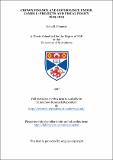Files in this item
Crown finance and governance under James I : projects and fiscal policy 1603-1625
Item metadata
| dc.contributor.advisor | Guy, John | |
| dc.contributor.author | Cramsie, John R. | |
| dc.coverage.spatial | viii, 294 p. | en_US |
| dc.date.accessioned | 2018-06-19T14:14:01Z | |
| dc.date.available | 2018-06-19T14:14:01Z | |
| dc.date.issued | 1997-06 | |
| dc.identifier.uri | https://hdl.handle.net/10023/14268 | |
| dc.description.abstract | This thesis is a fundamental reassessment of Jacobean crown finance and its importance in the early-modern English polity. The concurrent focuses are the Jacobean conceptualization of crown finance in terms of projects and the analysis of fiscal policy. Fiscal policy was dominated by attempts to balance the consumptive demands of the patronage culture with the fiscal needs of meeting the state's responsibilities of governance. The introduction describes the origins of projects and their relationship to the Jacobean patronage culture; it also discusses the importance of fiscal policy as a jumping-off point for a reassessment of the Jacobean polity. The structures of policymaking are examined in Chapter 1 with special emphasis on the process of counsel and the central role of James I in the responsibilities of governance. The conceptualization of crown finance in terms of entrepreneurial-like projects is fully explored in chapter 2 as is the importance of the doctrine of necessity in fiscal policy. Chapter 3 examines the nature of projects using a case-study of fishing fleet initiatives. The most significant challenge to the project basis of finance occurred in the parliament of 1621; the consequences of these events, long misunderstood as an attack on monopolies, are re-examined in Chapter 4. Origins of opposition to projects in popular culture, among James' ministers, and in parliament preface this chapter. The three chapters making up section II of the thesis seek to rehabilitate fiscal policy with a focus on policymaking and governance. Robert Cecil's project for fiscal refoundation would have established a precedent of public taxation to support the crown. Its collapse is subjected to a reinterpretation in Chapter 5 which challenges Revisionist orthodoxy on Jacobean parliamentary politics and political philosophy. Chapter 6 examines a number of attempts through conciliar policymaking (1611-1617) to meet ongoing financial challenges which ultimately influenced fiscal policy for the rest of James' reign. The concluding chapter recreates Lionel Cranfield's formulation and application of the abstract ideal of the public good in fiscal policy. Cranfield represents the sharpest Jacobean example of a minister seeking to balance the demands of serving the king and the state in their own rights; and the challenges of so doing. The conclusion places the thesis into a wider perspective of early- modern governance and our understanding of the Jacobean polity. | en_US |
| dc.language.iso | en | en_US |
| dc.publisher | University of St Andrews | |
| dc.subject.lcc | DA391.C8 | en |
| dc.subject.lcsh | Great Britain--History--James I, 1603-1625 | |
| dc.subject.lcsh | Great Britain--Politics and government--1603-1625 | en |
| dc.title | Crown finance and governance under James I : projects and fiscal policy 1603-1625 | en_US |
| dc.type | Thesis | en_US |
| dc.contributor.sponsor | David Russell Trust | en_US |
| dc.contributor.sponsor | Folger Consortium | en_US |
| dc.contributor.sponsor | Committee of Vice-Chancellors and Principals of the Universities of the United Kingdom | en_US |
| dc.type.qualificationlevel | Doctoral | en_US |
| dc.type.qualificationname | PhD Doctor of Philosophy | en_US |
| dc.publisher.institution | The University of St Andrews | en_US |
This item appears in the following Collection(s)
Items in the St Andrews Research Repository are protected by copyright, with all rights reserved, unless otherwise indicated.

